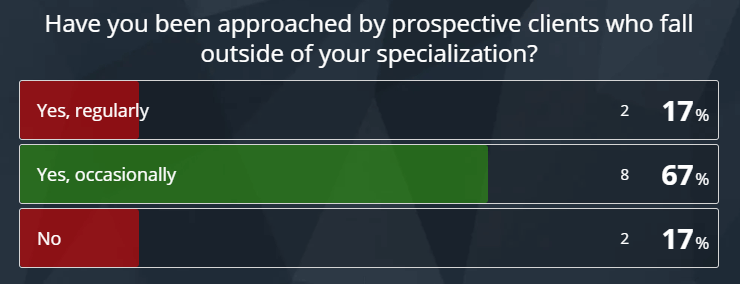A fundamental element of a marketing strategy for a consulting business is to have a specific target market.
You can probably help a whole range of different clients, and you might be tempted to keep your target market as broad as possible, particularly when times are tough and the economy is down.
After all, the more potential customers in your target market, the more opportunity, and the more likely you are to get projects – right?
Be the big fish in a small pond
 Actually, it might seem counter-intuitive, but having a smaller, more specific target market actually makes it more likely for you to get hired.
Actually, it might seem counter-intuitive, but having a smaller, more specific target market actually makes it more likely for you to get hired.
If you serve a single industry, you can be more specific in your communication – you can literally speak your clients’ language. Over time you will start to develop a greater understanding of their specific problems and needs. And because you’re serving a smaller market, you will start to become known throughout that market.
Specialists win clients
Think about these examples:
- “accountant” vs “accounting & financial strategy for the craft brewing industry”
- “management consultant” vs “we help energy services suppliers to retain and attract customers, while adhering to frequently changing laws and guidelines”
- “career coach” vs “salary negotiation coach for software developers”
- “web designer” vs “we create online membership portals for gyms”
In every scenario the more specific focus does point to a smaller target market. But that market is clearer, easier to reach, more likely to resonate with the messaging, and ultimately more profitable.
And it works.
How does a team of 5 beat 276,000?
One consultant I spoke with recently told me how his 5-person team had beaten PWC for a contract. PWC had 276,000 staff worldwide as of Oct 2019.
How does a team of 5 beat 276,000? Through vertical specialization they became the go-to firm in their vertical. Everyone in the industry knew them. They published research that the European Commission considered to be an authoritative assessment of their market.
Don’t just take my word for it.
The fastest growing firms are specialized vertically
Hinge Marketing said that their research has repeatedly shown that the fastest-growing firms tend to be specialists in a carefully targeted niche – an area of the industry that they understand thoroughly:
Not everyone recognizes specialization as a marketing technique, but in fact, it is among the most powerful. Why? Specialization impacts every aspect of your business, from the audiences you target to the messages you craft. Specialization makes all of your marketing efforts easier, because it tends to define exactly what you do and distinguish you from the competition.
Often, specialization forms the basis of a firm’s competitive advantage. If you understand a very particular slice of the marketplace better than anyone else, then you’re best-equipped to recognize what matters to them and speak to their needs. Specialization is perhaps the most powerful differentiator.
Choosing can be difficult, but very rewarding
You probably have several target markets that you’ve served so far.
My challenge for you here is to start thinking about choosing just one vertical. It might be the most interesting to work with, or the most affluent, or the most challenging – it’s your call. But you do need to choose ONE to market to.

This might scare the hell out of you. That’s ok. Personally I found it difficult too – but somehow I managed, and you can too.
Short-term Marketing Campaign
If you do find it a concept then I’ll ask you to think of this as just a temporary marketing experiment. You don’t have to change your whole business, but think of this as a 3-6 month “marketing campaign”.
We are talking about who you are targeting with your marketing, not limiting who you serve.
One other thing to help assuage your fear – I guarantee that within 12 months of you going public with your smaller target market, you will have someone from outside that group coming up to you and saying something like “I know you normally only work with dentists, but could you help us anyway?” – and you can choose to take on that work or not.
Over 3/4 of the vertically specialized consultants I asked said they had been approached by prospective clients who were not in their target industry:

If you need help narrowing down your target market, hit reply on this email and give me a little background on what you do and who you serve – I’ll see if I can help you with this!
And even if you don’t need help, I’d still love to hear about your target market – hit reply and let me know what it is!

